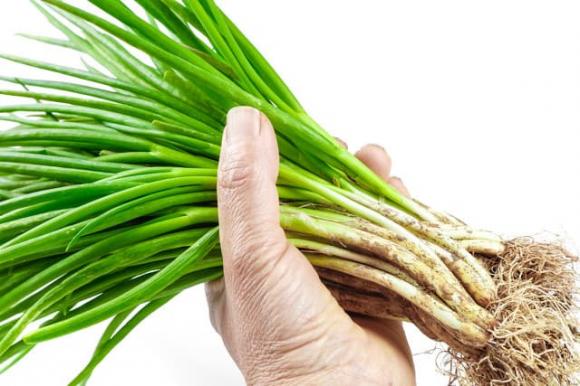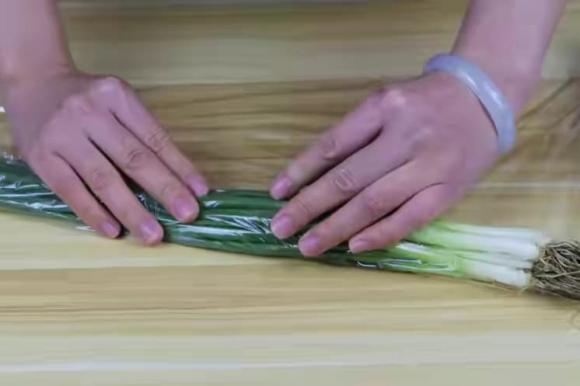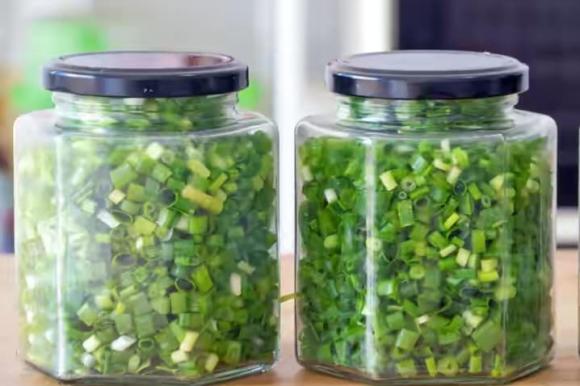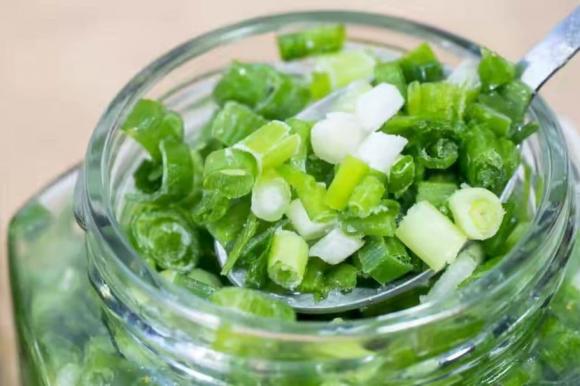Onions are inexpensive and lightweight, so most people tend to buy them in bulk. Spring onions, on the other hand, are mainly used for garnishing, so relatively smaller quantities are used, resulting in leftovers. Many people opt to store these leftovers in the fridge, but this doesn’t prolong their freshness for long. Generally, spring onions can be kept in the fridge for a day or two, but if stored any longer, they will lose moisture, wither, and even rot. Such spoiled spring onions have to be discarded, which is truly a waste. Below are two methods to store spring onions for extended periods, along with tips to make the process more convenient.
 Short-term Spring Onion Storage
Short-term Spring Onion Storage
This method is suitable for storing spring onions for a short period, and by following these steps, your spring onions should stay fresh for up to one or two weeks.
Moisture is the primary cause of onion spoilage, so it’s essential not to soak or thoroughly rinse the onions before storing them.
Place the dry onions you want to store on a table. Prepare a plastic bag and lay it flat on the surface. Start by placing the onions at one end of the bag, then roll them up, ensuring you tightly seal the bag, squeezing out as much air as possible. Store this roll in the fridge.

When storing spring onions, in addition to keeping them dry, it’s crucial to preserve both the roots and the tips. The roots continuously supply the necessary nutrients and moisture to the onions, while the tips help lock in moisture, thus prolonging the storage life of the spring onions.
Long-term Spring Onion Storage
This method is ideal for those who want to store spring onions for an extended period. By following these steps, your spring onions should remain fresh even after six months, and they’ll be convenient to use and carry.
1. First, pick and clean the spring onions you won’t be using immediately. Remove any wilted or yellow leaves and cut off the roots. Rinse the remaining onions with clean water.
2. Shake off the excess water from the spring onions or let them air dry. Then, place them on a cutting board and chop them into small pieces, approximately 0.5 cm in size.
3. Prepare two containers or bags designed for fresh produce storage. Place the chopped spring onions into these containers or bags, seal them tightly, and store them in the fridge.

4. Ensure that the chopped onions are dry before freezing to prevent them from freezing together in clumps.
5. When using frozen spring onions, whether for cooking noodles or making fillings, be sure to use them promptly after taking them out of the freezer. If allowed to thaw, the onions will turn black, release water, and develop an odd smell, resembling rot and decay.

There you have it—two effective ways to store spring onions. Give them a try, and feel free to share your experiences! Finally, thank you for your patience in reading through this article!
According to Cong Ly & Xa Hoi
Should You Choose Large or Small Carrots When Shopping?
Carrots have earned the nickname “little ginseng” due to their abundant nutrient content, especially carotene. This humble root vegetable is a staple in households across the globe. To ensure you’re getting the best carrots, packed with flavor and nutrients, here’s a quick guide on how to select the finest ones.
The Secret to Keeping Coriander Fresh All Year Round
Introducing the ultimate guide to keeping your cilantro fresh and vibrant for up to a year! Say goodbye to wilted, rotten herbs and hello to a vibrant, flavorful addition to your meals. With the tips and tricks from seasoned chefs, you’ll be able to transform your culinary creations and elevate your dishes to new heights. Learn the secrets to prolonging the lifespan of this delicate herb and enjoy its aromatic flavors all year round.
The Secret to Keeping Pork Fresh: Don’t Refrigerate, Try This Marinade Instead
For years, there has been a common misconception that freezing pork directly will result in tough and dry meat. However, a seasoned chef has revealed a secret technique that guarantees fresh and tender pork every time. Unveil the mystery behind this age-old trick and discover the key to unlocking the true potential of your pork dishes.





































